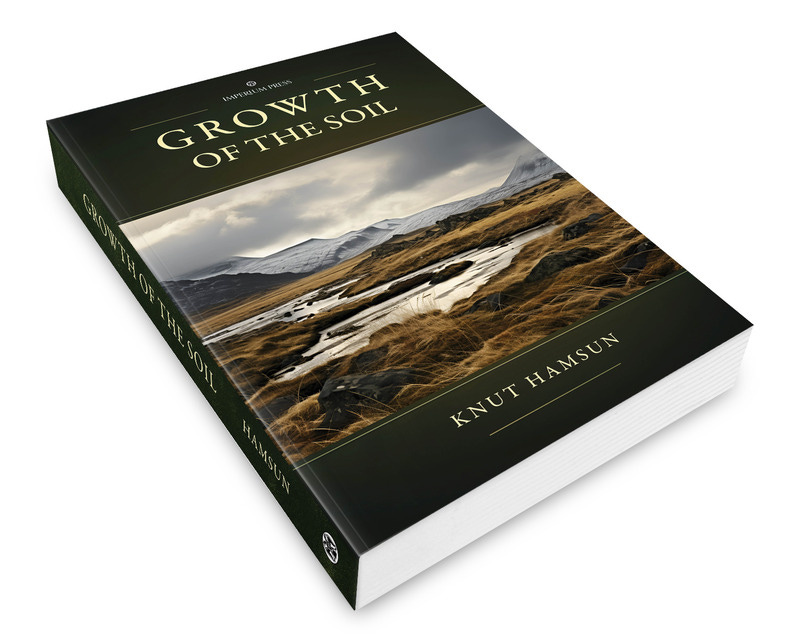Knut Hamsun: “Growth of the Soil”
Republication of Hamsun’s seminal novel Growth of the Soil (1917) is a chance for readers to reacquaint themselves with this great work or read it for the first time.
Imperium Press has decided to republish the important first English translation – the very one that was read so widely across the world and that consequently influenced literature in English, including Hemingway and Bukowski – so that we can relive the novel as it was encountered worldwide in 1921, the year after it was cited as the cause for Hamsun’s award of the Nobel Prize for Literature. I am proud to have written a new introduction to the Imperium edition.
The novel is the tale of a man called Isak who comes from nowhere to stake a claim on the northern wilderness. He makes a settlement in the rugged land near the Arctic Circle in Norway and we encounter the people in his life and get an understanding of the working life of a poor farmer living on the edge of the known world. Growth of the Soil is a blend of heroic realism, family saga, village drama and parable. It is the novel’s allegorical or parable-like qualities that many readers of a dissenting outlook find so compelling today. What are these qualities? Here is the beginning of my introduction to the new edition.
“Dagene de gaar. Aarene gaar. The days go by. The years go by.
“With pitiless truthfulness, the writer sets out what the course of time means for men. Birth, growth, vitality, fecundity, decline, death. A man walks through a forest until finds a place (in this stony, boggy terrain) with soil, water and light. He makes it his by building a shelter, felling trees, tilling soil, drawing water, raising animals. When a woman arrives in passing, then stays to help and live on there, he has a family. Proud, dour, independent, driven by the compulsion to work, the man – through the necessity to raise his wife and children above the level of primitive people – succumbs to the invidious influence of civilisation. Rather, it is society that impinges upon him. It is this civilisation which distances him from everything that is important: the sequence of seasons, the fertility of his woman, the life cycle of his animals, the passing on of knowledge, the truths of sun, rain, stone, earth, ice and seed. That is the tragedy of man, that making a place leads to the expansion of, and encroachment by, civilisation, which then must rob man of his vital connection to the soil. When man comes to own anything, society will surely come to own him.”
Why should we read (or re-read) the novel today? It speaks to us of essential struggles that any man must face and master. These struggles – and the truths they indicate – are more and more masked and denied by our technological society. Today we are told we have a right to go and exist anywhere and that no claim to land is justified. We are all homeless and will come to love our homelessness in the company of others, who too have no roots. Hamsun asserts that making a place, by carving it out from the wilderness, a man owns that place. He has made it habitable and deserves the fruits that he raises through his labour and guile. He has a right to guide his wife and educate his children to follow his example. The state does not own him, yet the state (and his community) will come to civilise him whether he wants it or not. The inevitable consequences are the complications and unhappiness that come with being separated from the land and the cycles of nature, and yoked to the state through law, property rights and taxation. Yet Isak must perforce be a member of society. He buys necessary tools for himself and luxuries for his wife – coffee is the status luxury of that time and this – has a wife who has relatives and his sons must be taught to read and they must marry. Community, like the state, must claim every man. This is an antidote to the heroic individualism of the lone man that we sometimes encounter. Hamsun says that even the hardiest and most resourceful of men is part of his clan and the will of the clan in a settled agrarian land is towards restraint, civilisation and conformity. The tragedy of the pioneer is that his sons cannot be pioneers in their turn unless they leave their home and who will farm their father’s land when he can no longer? Civilisation is a part of a cycle pioneering, building, then declining; one that cannot be refuted or evaded. That is just the saddest and most necessary lesson that Hamsun’s wonderful novel teaches us.
Purchase a copy here: https://www.imperiumpress.org/shop/growth-of-the-soil/



